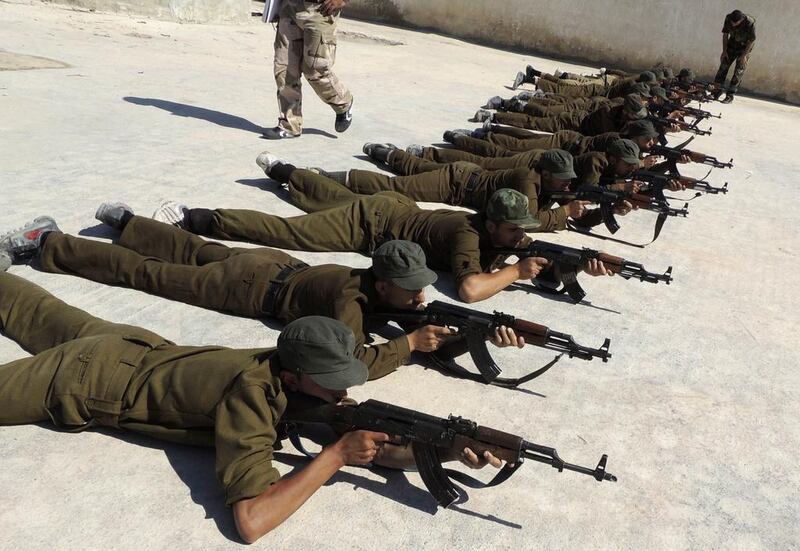ABU DHABI // Improved prospects for peace talks could escalate the fighting in Syria’s civil war as Arab Gulf states and Iran step up financial and military support to give their respective allies the upper hand ahead of negotiations, former Gulf officials, opposition figures and analysts say.
In recent days, current and former Saudi officials have promised to increase assistance to the opposition, including through arms transfers. Meanwhile, Iran and its allied Lebanese Shiite militia Hizbollah have continued to send fighters, military advisers, and crucial supplies to the Syrian regime.
“If you are not strong militarily you cannot be strong politically at the negotiating table,” said Mustapha Alani, director of the national security and terrorism programme at the Gulf Research Centre, describing Gulf states’ strategy.
Hopes of bringing the Assad regime and its opponents to the table for a long-discussed peace summit in Geneva have been revived by an international effort under way to eliminate Syria’s chemical arsenal.
As the possibility of peace talks edges closer, Dr Alani said, Saudi Arabia and other Gulf countries are “trying to change as soon as possible the balance on the ground”.
The Syrian opposition agrees.
“What we need really is a continuous support for the Free Syria Army so that we can force the regime to go to the negotiating table,” said Louay Safi, spokesman of the Syrian National Coalition.
Both sides of the Syrian conflict have been receiving outside help for months, in various forms and quantities. Backers of both the regime and the opposition, however, felt a new urgency two weeks ago, when a throwaway remark from the US Secretary of State John Kerry produced an unexpected diplomatic opening. In a news conference with his British counterpart in London on September 9, Mr Kerry suggested that Syrian president Bashar Al Assad should give up his chemical weapons to avert punitive US military strikes for a chemical attack on August 21.
Russia, an ally of the Assad regime, took the offer seriously, and Washington and Moscow have spent the subsequent weeks hammering out a plan that aims to destroy Syria’s chemical arsenal sometime in 2014.
The chemical-weapons discussions have also offered a new lease on life to a moribund peace process, the so-called Geneva II talks. First proposed by the United States and Russia last spring, the gathering is intended to forge a political end to the fighting but has been repeatedly stalled. Now, both countries have vowed to try to revive the conference.
While both the Gulf Cooperation Council group of countries and Iran say they support a political solution, their differences over its form could now fuel fighting on the ground.
The Gulf countries, led by Saudi Arabia, want to see “the destruction of the Syrian regime”, said Dr Alani. In recent days, former Saudi officials have vowed that Riyadh will more aggressively support the Syrian opposition so that Damascus arrives at peace talks in a diminished position.
“The Saudis will use all tools available to oust Assad”, wrote Fahad Nazer, a former political analyst with the Saudi Embassy in Washington, in the New York Times on Saturday. “Saudi Arabia will intensify its efforts to arm the rebels and to use its media outlets and diplomatic clout to rally support for a military strike.”
Without US military intervention, “the burden of managing the political, economic and financial chaos of the regional consequences [of Syria] falls on the Saudi-led GCC”, said Nawaf Obaid and Jamal Khashoggi, both former aides to the ex-Saudi ambassador to Washington, Prince Turki Al Faisal, in an article for CNN.
“The removal of Al Assad is simply too important an opportunity to check Iranian interference in the Arab world for the Saudis and their allies to leave it to a deceitful Russian plan.”
The Saudi Cabinet has also vowed to support the opposition’s right to “self defence”, a term used by resolutions in the Arab League since late March to allow Gulf states to provide military assistance to the rebels.
The international community should “provide protection for the Syrian people and help them to be able to defend themselves to reach a fair regime in Syria”, said a statement on the state news agency on September 16.
Saudi analysts and opposition figures describe Gulf support to the opposition as a mere counterbalance to continuing assistance the regime receives from allies in Iran, Russia and Hizbollah.
Last week, the Wall Street Journal reported that “busloads of Shiite militiamen from Iraq, Syria and other Arab states” were undergoing training in Iran, in preparation for joining the Syrian army against the rebels. Hizbollah already has unknown numbers of fighters in Syria.
Whether the influx of external support will shift the balance of power on the ground is still unclear, said Dr Alani.
One reason has to do with the logistics of the weapons transfers from Gulf states to the rebels. The United States, which has been reluctant to give the rebels arms, fearing these could end up in the hands of extremists, could plug the pipeline if it becomes alarmed by the types of weapons or their recipients.
“Saudi Arabia and other countries are relying heavily on transit states like Turkey and Jordan,” he said, “but they are fully aware that an American objection could at any minute sabotage the whole process.”
For the moment, Mr Safi of the SNC described Gulf support to rebels as coming in “waves”, adding, “This is not really helpful. Because meanwhile, the regime continues to receive unconditional support from its allies.”
edickinson@thenational.ae





